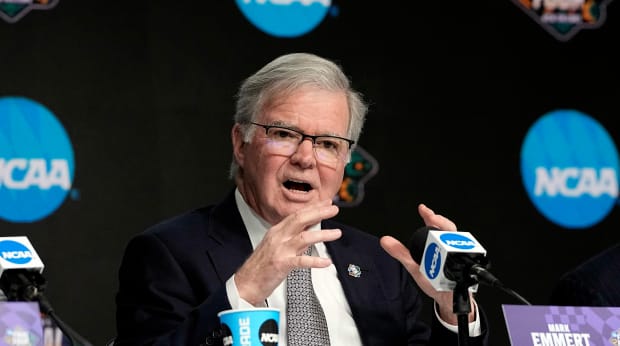NEW ORLEANS — As Mike Krzyzewski was leaving the dais at the end of his Final Four press conference here Thursday, he murmured a parting shot into the microphone in front of him: “Good luck with the next one.”
The next one on the dais, as Coach K and everyone else in the room knew, was Mark Emmert. For years, the president of the NCAA has served as a bloated target for millions of Americans disenchanted with the leadership of college athletics—but Mike Krzyzewski is hardly just another critic in the peanut gallery. When the most prominent coach of the past three decades in any college sport passive-aggressively mocks you, that’s not good.
Asked what he would like to know from Emmert, the retiring Duke legend all but called the NCAA a rudderless ship lacking direction. “I have many questions,” Krzyzewski said. “Where are we going? And who is going to be in charge? Not that I’m saying that (Emmert) shouldn’t be. But what are we doing?”

AP Photo/David J. Phillip
Big, existential questions. Apropos of the NCAA’s big, existential crisis.
What the NCAA is doing is engaging in a desperate game of catch-up as society (and Congress) moves along ahead of it. After decades of resisting a modernization of its amateurism rules, the NCAA has taken so many Ls in court that its record roughly resembles Connecticut football’s. After dragging its feet on player compensation, the new NIL Era is a free-for-all in need of defining and refining. After decades of failing to enforce rules that were being broken with impunity, and then failing to quickly prosecute the scofflaws that it could catch, Washington politicians are preparing legislation to completely overhaul NCAA enforcement. After decades of a widening gulf between the most athletically powerful schools and everyone else, the scramble is on to custom-fit bylaws to those varying levels of competition.
“We’ve got a real short window,” Emmert says of the time for the NCAA to implement massive changes.
How short? Some big answers are expected as soon as Aug. 1. That’s when the NCAA’s Transformation Committee, co-chaired by Southeastern Conference commissioner Greg Sankey and Ohio University athletic director Julie Cromer, is expected to deliver a set of recommended changes. The early advertising on those changes is that they won’t be subtle.
“It is upon us,” Cromer said Thursday. “We received this board charge to be transformative. And in fairness, we went back to them and asked them a second time, ‘Is that really what you mean? You really mean transformation with a capital T?’ We feel confident that charge was verified.”
The committee’s work to date was first focused on infractions and enforcement, namely rules modernization. That would include a quicker pace of resolution for infractions cases, and a general desire to stop majoring in minors. “We’re really good at making rules,” Sankey said. “We’re not as good at deleting rules."
From there, Cromer said the next step is investments to support athletes. We’ll see what they come back with—and what Congress continues to come up with in the meantime.
After failing to do the work itself, the NCAA opened up the political Pandora’s Box by asking Congressional help on crafting national NIL legislation. That has since expanded to input on other facets of college sports, including some wild stuff this week that would give the Department of Justice the ability to go after NCAA officials if they fail to do the job as directed.
This is a byproduct of a bureaucracy filled with smart people but crippled by inaction, lack of vision, lack of cohesion and lack of conviction to move forward boldly.
“It’s a new day that should have been a new day decades ago,” Krzyzewski said. “So we’ve got a lot to make up for.”
The eternal problem in college athletics is that every proposed solution breeds its own set of unintended consequences. Which means the entire enterprise tends to go through cycles. A bright idea falls out of favor, then comes back again a generation or two later.
Athletic directors were the primary power in college sports for a long time, until the rate and number of scandals was deemed unacceptably high and the call went out for school presidents to exert their influence on athletics. Now we’re back to phasing out presidents and putting more power back in the hands of ADs.
Jock dorms were considered a problem, and a call went out for athletes to be less isolated in one corner of campus. Then various sports—particularly football—turned their facilities into all-day gathering places. Study there, watch film there, lift weights there, play miniature golf there, get your hair cut there, even take naps there.
Conference offices once did their own investigating of rules violations by member schools, but conflict of interest (and lack of desire) necessitated that the NCAA national office take control of everything. Now, we are moving toward conferences having increased autonomy to implement some of their own rules. (However, Sankey said there likely still would be “national accountability” for enforcement, which would mean the NCAA probably would still be the cops.)
What is rolled out in August (if that timeline holds) should indeed be mold-breaking. It should be fairer to athletes, and perhaps a better custom fit for schools depending on their competitive aspirations.
It needs to be. When the star of this Final Four show is calling out the NCAA president during a press conference, the disconnect between the governing body and those competing is glaring. Coach K speaks for many.
Said Cromer, “I think he’s not the only person who’s disenchanted with the current system.”
• Congress Introduces Bill to Investigate Gender Equity Within NCAA Operations
• Bipartisan Bill in Congress Seeks Overhaul of NCAA Infractions Process
• Power Ranking the 2022 Men’s Final Four







